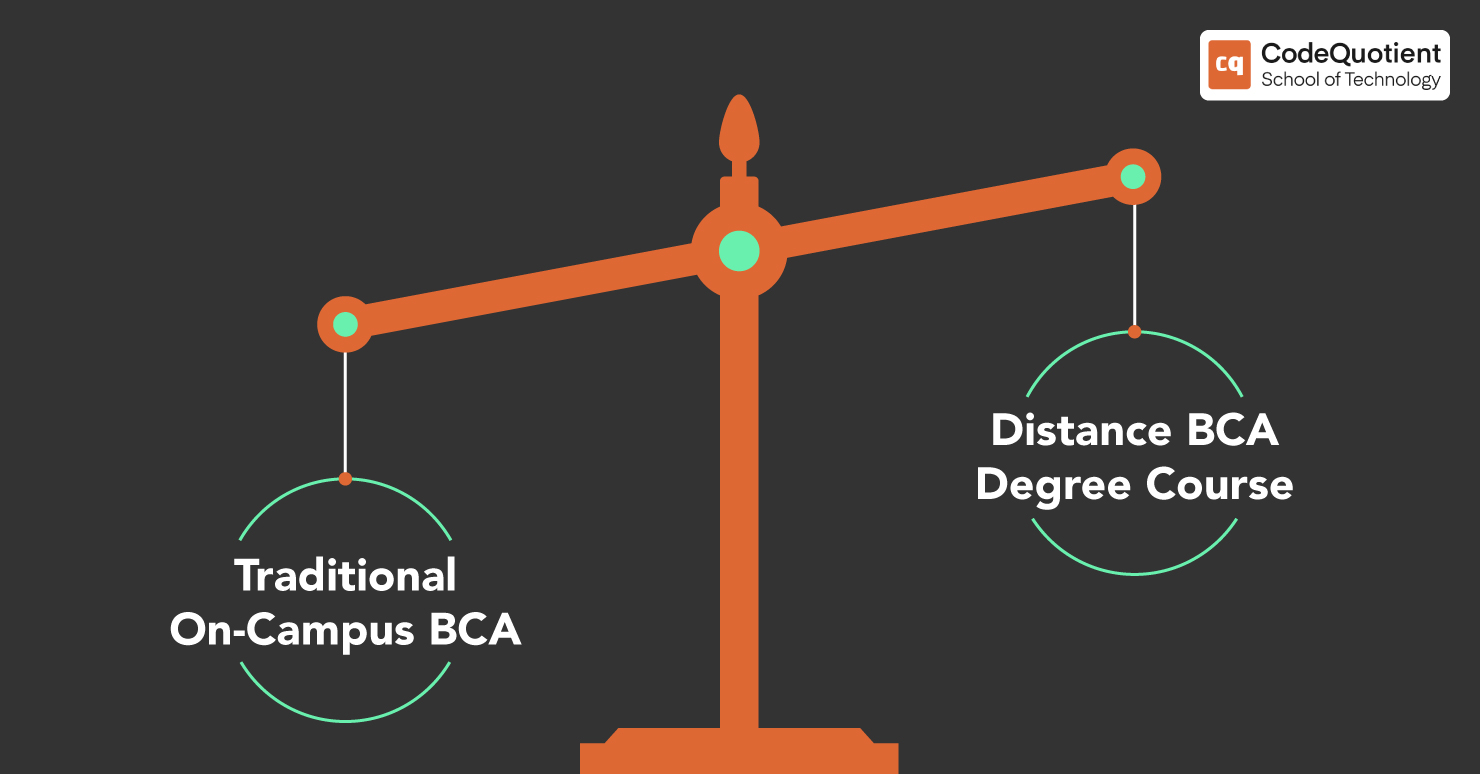Are you planning to pursue your BCA degree course to secure a job in the IT industry? That’s a smart move, indeed!
Graduates who have completed their BCA are in high demand as computer applications are not limited to IT only. There are several job opportunities across industries.
Today, we’ll compare two career paths for you: an online BCA degree curriculum and a campus-based BCA program. Based on a comparative evaluation, you can make the best decision regarding which BCA degree course is the right fit for you.
What Is a BCA Degree Course?
The Bachelor of Computer Applications (BCA) degree course is an undergraduate program designed to provide a comprehensive understanding of computer applications and their role in the digital age.
The course typically covers a range of topics, including programming languages, database management, computer networks, and software engineering.
Overview of Distance BCA Degree Course
When you opt for a distance BCA degree course, check out which path you’re choosing:
Pros
1. Flexibility and Freedom
Distance learning offers the ultimate flexibility. You can study from the comfort of your home or anywhere you choose. This option is ideal if you have a busy schedule or family commitments or simply prefer a self-paced learning environment.
2. Affordable Option
Typically, distance BCA degree courses are more affordable than traditional on-campus programs. You can save on various expenses, such as transportation and accommodation since you won’t need to commute to a physical campus.
3. Self-Paced Learning
With distance BCA, you can often set your own pace of study. This is advantageous if you’re a self-motivated learner who prefers to dive deeper into certain topics or accelerate your progress in areas where you excel.
Cons
1. Limited Hands-on Experience
One of the challenges of distance learning is the potential lack of hands-on experience. While you’ll gain valuable theoretical knowledge, you may miss out on the practical, real-world application of concepts, which is often a key component of BCA courses.
2. Peer Interaction and Networking
Distance BCA programs may not provide the same level of peer interaction and networking opportunities as traditional on-campus programs.
3. Self-Discipline and Motivation
Distance learning requires a high degree of self-discipline and intrinsic motivation. Without the structure of regular classes, you’ll need to manage your time effectively and stay focused on your studies independently.
Traditional On-Campus BCA Program: An Overview
Traditional on-campus BCA programs offer a more interactive and structured learning environment.
Pros
1. Comprehensive Campus Experience
Opting for a traditional on-campus BCA program gives you full access to the university’s facilities, including well-equipped computer labs, extensive libraries, and other resources that can greatly enhance your learning experience.
2. Direct Interaction and Networking
One of the biggest advantages of on-campus learning is the opportunity for direct interaction with faculty and peers. You can engage in class discussions, clarify concepts immediately, and benefit from diverse perspectives.
3. Structured Learning Environment
The structured nature of on-campus programs provides a clear framework for your studies. Regular classes, assignments, and assessments help maintain discipline and motivation.
You’ll also have access to on-campus support services, such as academic advising, study groups, and extracurricular activities, which contribute to a well-rounded education.
Cons
1. Less Schedule Flexibility
Traditional on-campus programs typically require physical presence in class, which may be challenging if you have other commitments or prefer a more flexible schedule. Balancing class timings with other responsibilities can be demanding, especially if you work or have family obligations.
2. Commute and Physical Presence
Traditional on-campus learning requires physical presence, which may involve commuting to and from the campus. This can be time-consuming and may limit your ability to pursue other activities or commitments outside of your academic schedule.
A Contemporary Alternative: Introducing the CodeQuotient School of Technology

Let’s explore an innovative alternative that blends the benefits of both distance and traditional learning: The CodeQuotient School of Technology offers a 3-year BCA + UG Program in Software Engineering that combines on-campus academic sessions with on-site practical training.
This blend ensures you gain both theoretical knowledge and real-world experience. The program is designed to prepare you for industry demands, giving you a competitive edge in the job market.
Extensive Internship Opportunities
One of the standout features of this BCA degree course is the opportunity for up to 1.5 years of paid internships. During these internships, you’ll apply your skills to real-world projects, build your professional network, and gain valuable industry experience that sets you apart.
Industry Integration
The CodeQuotient School of Technology has strong ties with hiring partner companies. This industry integration means that your education will be closely aligned with the skills sought by top employers.
You’ll graduate with not just a UGC-recognised degree but also practical experience and a network of professional connections, making you highly employable.
3 Factors to Decision-Making
When choosing your BCA degree course, consider these:
1. Career Goals and Industry Requirements
Think about the type of career you want and the specific industry you aim to work in. Certain fields may require more hands-on experience or specialised skills. Consider which option, distance or traditional BCA, aligns better with your career aspirations and the current industry trends.
2. Learning Style and Personal Circumstances
Reflect on your learning style and personal commitments. Do you prefer the flexibility of distance learning, or do you thrive in a structured classroom environment? Consider your daily routine, work or family obligations, and the level of self-discipline you can maintain for your studies.
3. Financial Considerations
Both distance and traditional BCA degree courses have different financial implications. Evaluate the tuition fees, additional expenses, and potential sponsorship opportunities. Consider the return on investment and choose the best option for your future goals and financial situation.
Your journey towards a successful career in computer applications starts here!
Choosing the right BCA degree course is an important decision impacting your future career trajectory.
Assess your personal and professional goals, and consider how each option aligns with your aspirations.
But if you want to go beyond the confines of a conventional BCA degree course, get in touch with us or visit the CodeQuotient School of Technology website to learn more.




